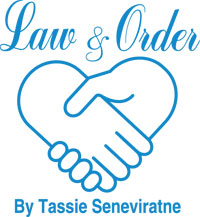Sunday Times 2
Communications gone topsy-turvy in Sri Lanka Police
View(s): Reports on senior police officers contradicting each other and even accusing each other of lying have become a common feature in the media these days.
Reports on senior police officers contradicting each other and even accusing each other of lying have become a common feature in the media these days.
Former Inspector General of Police (IGP) Pujith Jayasundera and former Senior Deputy Inspector General M.R. Lathif, who was the head of the of the Special Task Force, are two witnesses among others who are trading allegations of lying, at several inquiries in relation to last year’s terror attacks on Easter Sunday. Apart from creating a sad spectacle, they are disgracing the entire Police Service. Junior officers lament that they are ashamed to face the public.
All this being in the public domain, pertinent questions are raised by people, citing laid down procedures:
Surely, orders governing correspondence should help to put the records straight. Chapter A21 of the Police Departmental Orders (DO) meticulously deals with the subject of correspondence. It starts with the stipulation that “the undermentioned orders are issued in addition to the regulations provided in Chapter 11 of the Government Manual of Procedure. (GMP)
Section (2) of the DO lays down that “every letter and communication will be numbered and dated at the top. Section (10): “Subject headings will be given to all letters and memoranda.”
As for the GMP, it stipulates inter alia:
* All outward letters are handed over to the receptionist for entering into the outward register with the list of names.
* The receptionist enters all letters into the outward register specifying under the relevant categories.
* Once registered, all letters are handed over to the ‘back office’ for stamping, if there is no one available in the back office, the Management Assistant (MA) shall stamp the letter, while entering same into the register stating the amount, name and signature.
* The back office person will deliver all letters to the post office.
* In the case of ‘despatched letters’, acknowledgements are obtained in a ‘delivery book’ maintained for the purpose.
Similarly inward letters/parcels are registered and movement of correspondence recorded in like manner so that they can be traced back easily. These tried and tested procedures are there to catch up with humbugs.
Then, how is it that the exchange of letters was not subjected to this line of questioning at inquiries in connection with the Easter Sunday bombings? Was it not easy for witnesses to give contradictory evidence when there is no fear of cross examination? Could they have got away in court cases with this type of contradictory evidence?
I am reminded of an incident in the mid-1960s. Sub-inspector Malcolm de Cruze arrived at the Inspectors’ Mess at Colombo Fort after facing the interview board for promotion to rank of Inspector, as did most of them to unwind from the tension of facing the board. Malcolm came frothing mad and told us how a civilian on the interview board had asked him about a punishment awarded to him. When he had tried to explain that he was a victim of circumstances as he had only accompanied a senior inspector who had conducted the detection in question, the civilian had sternly told him, “Don’t quibble, Cruze,” and with that had ended his interview. Malcolm was furious over it.
When we checked from others who had appeared before the same board, as to who this civilian was, it was hilarious to learn that it had been DIG/CID John Attygalle whom Malcolm had not seen earlier.
John Attygalle had studied the personal files of the candidates beforehand, and could not be hoodwinked by interviewees. Such officers seem to be a vanishing breed.
Whether at interview boards or inquiry panels, officials should similarly acquaint themselves with all procedures and available information, so that the interviewers will be in a position to elicit relevant evidence without being taken for a ride by the interviewees.
When laid down procedures are not adhered to in the police, it is a sad reflection on supervision. It appears that training supervisory officers in basic procedures is urgently called for.
As I write this, I have received an email from the President of the Retired Senior Police Officers’ Association (RSPOA) informing the members of a request from the IGP for assistance to conduct lectures to probationary sub-inspectors and constables “on the core competences and professional ethics and important aspects of a Police Officer, at the Police College in Kalutara”.
This is an admission that there are no senior officers among the serving officers — not even the National Police Commission, competent enough to deliver these lectures. Such being the situation, should not the lectures start at the top, and train senior officers in service who can then pass the core values down the line? Surely you cannot expect bottom layer officers to train the top layer!
(The writer is a Retired Senior Superintendent of Police. He can be contacted at seneviratnetz@gmail.com and mobile phone 0774475144).

